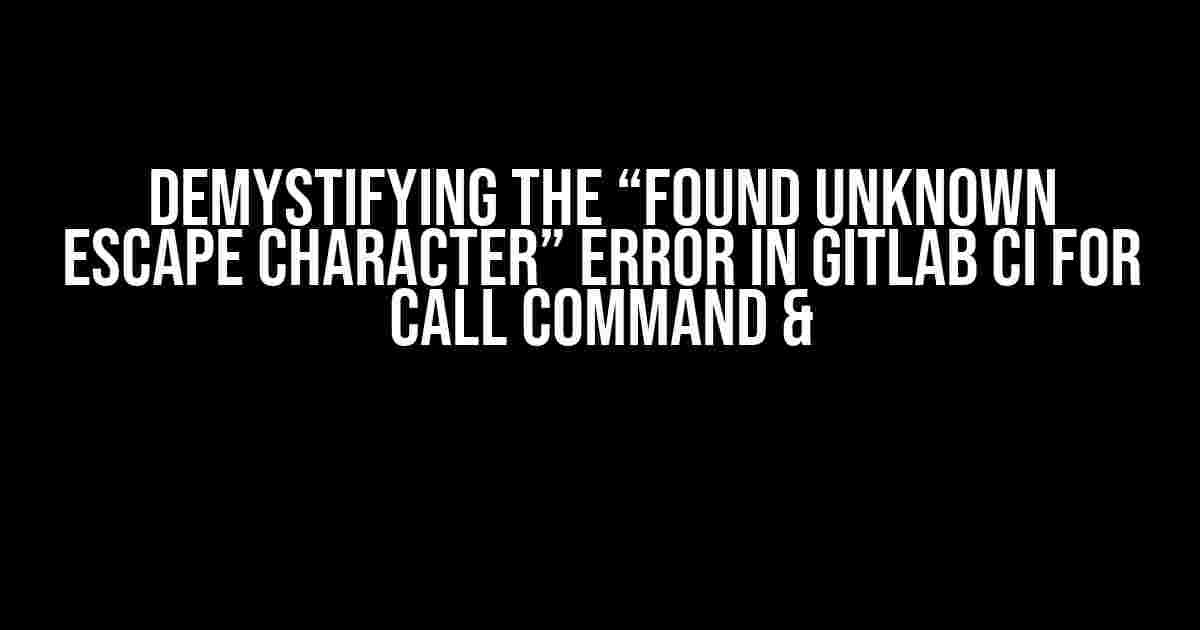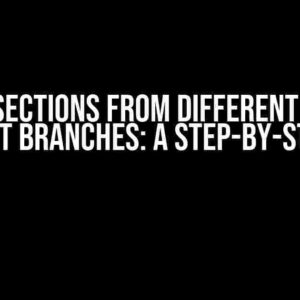Are you tired of encountering the frustrating “found unknown escape character” error in Gitlab CI when using the call command &? You’re not alone! This error can be a real productivity-killer, especially when you’re trying to automate tasks in your CI/CD pipeline. Fear not, dear reader, for we’re about to dive into the world of character escaping and explore solutions to this pesky problem.
What’s Causing the Error?
Before we dive into the solutions, let’s understand what’s causing the error in the first place. The call command & is used to execute a shell command in Gitlab CI. When you use this command, Gitlab CI tries to parse the string as a shell command. However, when the string contains special characters like &, it can get misinterpreted, leading to the “found unknown escape character” error.
call &'my_command'In the example above, the & character is being used to execute the command, but it’s also part of the command itself. This dual role can cause confusion, leading to the error.
Escaping the & Character
One way to resolve the issue is to escape the & character using the backlash (\) or double quotes (“). Let’s explore both methods:
Method 1: Backslash (\) Escaping
call \&'my_command'By adding a backslash before the &, we’re telling Gitlab CI to treat it as a literal character instead of a special shell character. This should fix the error and allow your command to execute successfully.
Method 2: Double Quote (“”) Escaping
call "&my_command"Wrapping your command in double quotes tells Gitlab CI to treat the entire string as a single command, including the & character. This method is particularly useful when you have multiple special characters in your command.
Using Single Quotes (‘ ‘) Instead of Double Quotes (“”)
Another approach is to use single quotes (‘ ‘) instead of double quotes (“”) when wrapping your command. This can be useful when you need to pass variables or environment variables as part of your command:
call '''/my/command ${VARIABLE}'''In this example, we’re using single quotes to wrap the entire command, including the variable ${VARIABLE}. This ensures that the variable is properly expanded and passed to the command.
Common Scenarios and Solutions
Let’s explore some common scenarios where the “found unknown escape character” error might occur and how to resolve them:
| Scenario | Error | Solution |
|---|---|---|
| Using & in a command string | call &'my_command' | call \&'my_command' or call “&my_command” |
| Passing variables in a command | call '/my/command ${VARIABLE}' | call '''/my/command ${VARIABLE}''' |
| Using & in a command with arguments | call &'my_command arg1 arg2' | call \&'my_command arg1 arg2' or call “&my_command arg1 arg2” |
Best Practices for Avoiding the Error
To avoid the “found unknown escape character” error in the future, follow these best practices:
- Use double quotes (“”) or single quotes (‘ ‘) to wrap your commands: This helps to clearly define the command string and avoid misinterpretation.
- Escape special characters using backslashes (\) or double quotes (“”): When using special characters like &, make sure to escape them properly to avoid errors.
- Use variables and environment variables carefully: When passing variables or environment variables as part of your command, make sure to wrap them properly to avoid errors.
- : Testing your commands locally can help you identify and fix errors before they reach your pipeline.
Conclusion
The “found unknown escape character” error in Gitlab CI can be frustrating, but it’s easily resolvable with the right strategies. By understanding the causes of the error and applying the solutions outlined in this article, you can overcome this obstacle and get your CI/CD pipeline running smoothly. Remember to escape special characters, use double quotes or single quotes to wrap your commands, and test your commands locally before adding them to your pipeline.
With these tips and techniques, you’ll be well on your way to mastering Gitlab CI and automating your tasks with confidence. Happy coding!
Frequently Asked Question
Stuck with the pesky “found unknown escape character” error in GitLab CI? Worry not, we’ve got you covered!
What does the “found unknown escape character” error mean in GitLab CI?
This error occurs when GitLab CI’s shell interpreter encounters a special character in your command that it doesn’t understand. The ampersand (&) is a special character that’s used to run commands in the background, but when not properly escaped, it can cause this error.
How do I escape the ampersand (&) character in my GitLab CI command?
To escape the ampersand (&) character, simply add a backslash (\) before it. For example, instead of `call &`, use `call \&`. This tells the shell interpreter to treat the ampersand as a literal character rather than a special command.
Can I use double quotes to escape the ampersand (&) character?
Yes, you can use double quotes to escape the ampersand (&) character. Instead of `call &`, use `”call &”`. The double quotes tell the shell interpreter to treat the entire command as a single string, including the ampersand character.
What if I’m using a Windows batch command in my GitLab CI script?
For Windows batch commands, you’ll need to use the caret (^) character to escape the ampersand (&) character. For example, instead of `call &`, use `call ^&`. This tells the Windows batch interpreter to treat the ampersand as a literal character.
How can I test my GitLab CI script to ensure the ampersand (&) character is properly escaped?
To test your GitLab CI script, simply run it locally using the `gitlab-ci-multi-runner` command. This will allow you to see the output of your script and identify any errors, including the “found unknown escape character” error. You can also use the GitLab CI linter to check your script for errors before running it.


